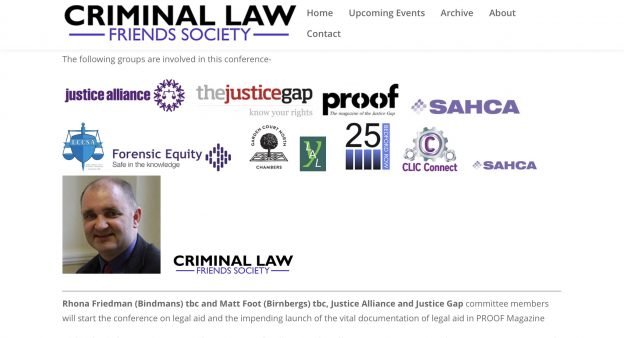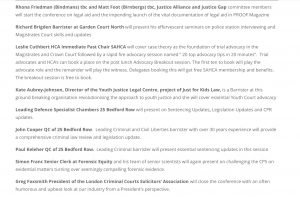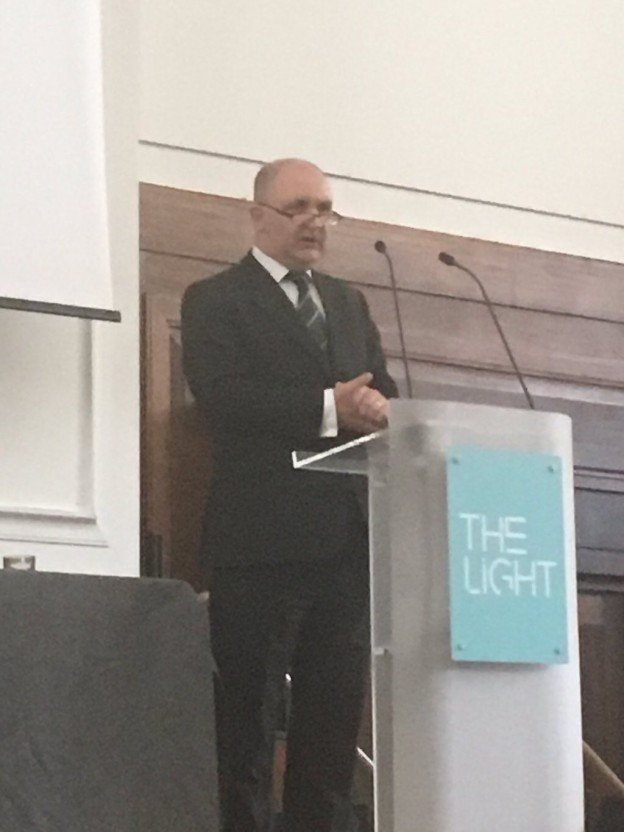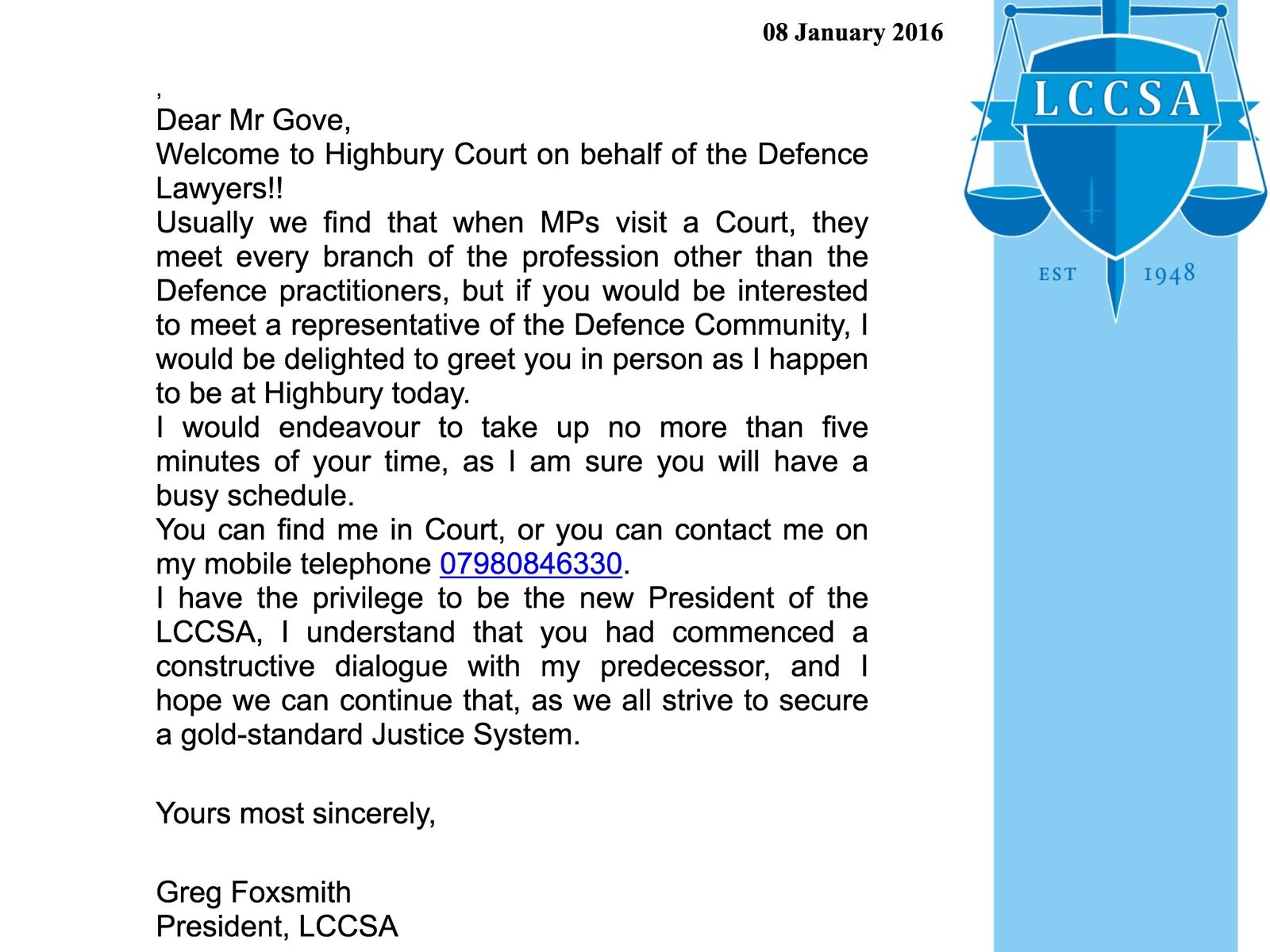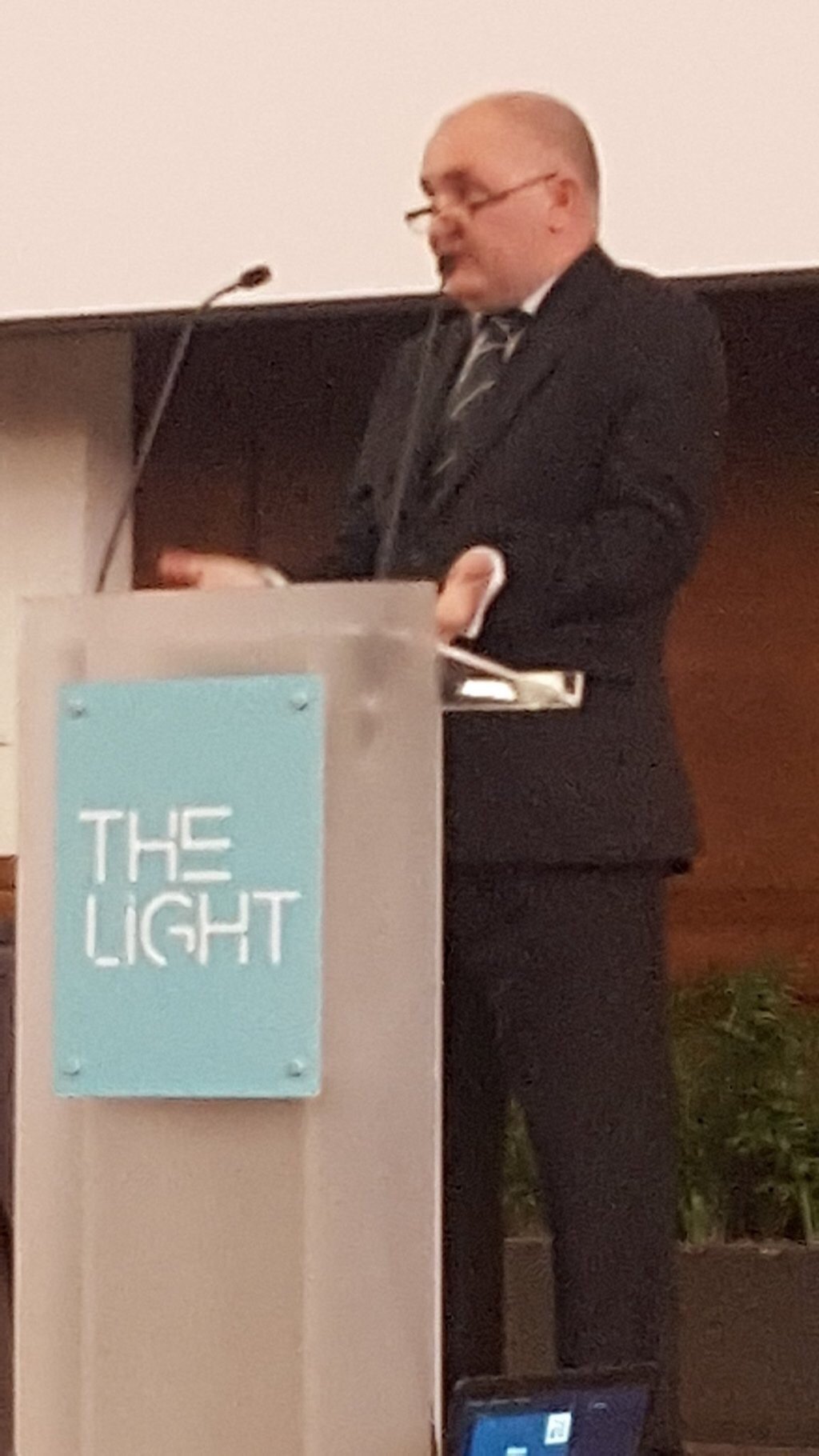Edited text of speech at CLFS Conferences (delivered 21/10/16 Manchester + 28/10/16 London)
Intro
I have been asked to speak on unity in the profession.
I am no better qualified than anyone else to speak on this topic, but I suppose being involved in a representative body- in my case the LCCSA– has given me some small insight into where we as criminal lawyers have successfully united, and where we have not.
Last week I attended the Parmour lecture for the Howard league, delivered by Nick Hardwick, now at parole board but perhaps better known in his previous capacity as a fearless Inspector of Prisons, whose reports graphically condemned prison after prison as unfit for purpose.
The audience included, as you might expect, bleeding hearts, liberals, lefties, lawyers, the usual suspects. So as you may imagine. I was at home.
But the lecture was at Clifford Chance, and I did not feel at home in their glittering building in Canary Wharf.
Lawyers there are not familiar with the type of law that we do anymore than we are with their commercial activities
They don’t understand criminal law as we understand it
(Although I did read last week that somebody employed in a City firm was sacked and struck off for stealing stationery. Perhaps it’s only to be expected that things disappear in a magic circle firm…)
Anyway…
At Clifford Chance, they don’t practice legal aid
A fixed fee for an entire case at the magistrates court is equivalent to the hourly rate of lawyers there.
What do we have in common with these “masters of the Universe?”
We have the same regulatory body, we pay the same practicing certificate, we are in the same profession….
..and we have virtually nothing in common.
So we can’t expect unity with City firms
Or can we?
Underneath their expensive suits do these lawyers not still have an interest in justice? Might they not help us? There was discussion at one point of a 1% tax on Commercial Law firm profits to fund Legal Aid. That’s not going to happen, but can we, should we, dare we approach our better-heeled fellow lawyers and ask for help?
I do not mean encouraging the provision of well intentioned “pro-bono” advice from junior employees at the Law Centre, but can they support legal aid practices by eg seconding trainees, or providing support services, in the way a PL club may “loan” a player to a less well-heeled club?
Or can they help us lobby MoJ using their access to the corridors of power?
Just ideas.
Unity.
Unity in the Profession
What about the High St Practice? The one-stop shop with a range of services , a holistic approach?
Law is increasingly fragmented, and LASPO has ripped the heart out of much of what would have been publicly funded advice.
We think we have it bad in Criminal Law, but where were we when multi-disciplinary practices were axing family departments, abandoning employment, immigration and welfare benefit advice? Were we campaigning and fighting for the principle of equal access to the law, or squabbling about page count?
We need to fight for Justice generally, not be marginalised into separate spheres of narrow self-interest.
Representative bodies try to do this, meeting together -TLS, LAPG, YLAL, CBA
Can we expect unity with our fellow lawyers from other disciplines? Do even we deserve it?
Can we achieve it even between ourselves as criminal lawyers? We are all competitors in a diminishing market.
I believe that although we have much that divides us we criminal lawyers have much more in common
We have , I think, an overarching interest in justice
This is not a job, or even just a profession, it is a vocation.
Of course we all have a degree of self interest, and we all would like to be well paid.
Or at least properly paid.
Or sometimes even paid at all.
But we care about the principle of justice.
And we actually want what the current Govt has adopted as a slogan- a “criminal justice system that works for all”
We are united in wanting for example:-
-video-links that work,
-prisoners to arrive on time,
-competent interpreters to be booked,
and an opportunity to assess the evidence, and give proper advice , and get proper credit for pleading guilty without being rushed or bullied into pleading.
We want a level playing field, we want a fair hearing.
So there is understandably good unity when we campaign on those issues that we all agree on.
Unity against a common enemy
Lawyers individually and their Practitioner Groups are at their best when have a common cause or better still a common enemy.
When we don’t it all falls apart and we can get back to hating each other, like the PFJ vs the JPF.
The last time we had a very obvious common enemy, it was an easy target, an odious pig-headed individual who will be forever remembered as worst LC ever.
I probably don’t even need to say his name, but it rhymes with Failing.
Which brings me back to the Howard League lecture I attended last night. Much of Grayling’s bad work has been overturned or abandoned, but in the failing prison estate we are seeing the legacy of Grayling’s cuts and policies.
The shocking murder in Pentonville this week is the 6th murder in prison SO FAR THIS YEAR.
Grayling described the increase in deaths in custody as a “blip”
I invite you to pause for a moment and consider that continuing blip
In last 12 months, over 300 deaths in prison (up 30%)
Over 100 were prisoners taking their own life.
Over 10k self harm incidents
Over 20k assaults
And the prison population keeps rising, as the resources and staffing for the prisons diminishes.
And where are the prison lawyers?
Access to legal advice to prisoners was heavily curtailed by Grayling in September 2013. That reform has not overturned.
Where were we when prison law was being axed?
First they came for the immigration lawyers, but I didn’t speak out because I wasn’t an immigration lawyer.
Then they came for the prison lawyers, but….
Well you know how it goes.
But it’s not all doom and gloom.
Let’s look at and celebrate what we can achieve when we are united-starting with “two-tier”
Unity in Adversity (fighting the two-tier litigation)
In January we had “the victory”, and although there was much relief, there was only muted celebration.
For those who don’t know or don’t remember, TT was the controversial contract-tendering procedure which would restrict the number of law firms permitted to do duty legal work.
It was hatched by the MOJ and initiated by Chris Grayling, the previous Injustice Secretary. It was supported -encouraged even- by some firms in the “Big Firms Group”.
Accompanying this was a proposed 8.75% fee cut, the follow up to the first 8.75% cut we had already absorbed
Much time, energy – and money – had been expended on tortuously difficult tendering documents, much anxiety hanging on the results. Firms had closed or merged in anticipation of the outcome, or planned mergers. Solicitors changed firms- only some voluntarily.
It threatened to wreak havoc on a supplier base acknowledged to be fragile, and for comparatively modest savings.
This proposed enforced consolidation of the profession would have effectively forced many firms to merge or close.
This, despite an acknowledgement that over the last parliament annual spending on legal aid was reduced from £2.4bn to £1.6bn.
What went wrong?
TT was wrong in principle, but to add insult to injury it was ultimately botched in application.
Contracts were awarded, and a whistleblower revealed the marking had been carried out by unqualified temps from a recruitment agency.
So unsuccessful firms took legal action against the MOJ
They banded together in a consolidated group action.
And they were successful.
Unity.
Before the tendering process began, there was a JR in which we argued the whole scheme was irrational.
The LCCSA was proud to have fought that battle, together with CLSA and TLS.
We lost.
And it was expensive.
We campaigned and fundraised.
Many of you contributed – thank you.
Counsel’s fees from Admin set 11kbw totalled around £150k (which goes to show why we should practice admin law not crim law)
It wasn’t pro-Bono, and it wasn’t mates rates.
That meant, despite generous donations, we depleted our reserves and gave our committee sleepless nights. We were not indemnified against losses, we were personally liable.
So in our darkest hour, we had to fundraise and more importantly trust that people would renew their memberships just to survive.
So the fact that we have survived as an Association, with membership steady, is a victory for Unity.
Although you may be interested to know that when we asked 11KBW whether they would contribute or sponsor an LCCSA event, answer came there none.
Instead our sponsorship came from friends at the criminal bar who don’t command such eye-watering fees, small firms, and individual solicitors.
I thank you.
Unity!
Unity in Campaigning
On May 22nd 2013 the LCCSA organised our first demo outside Parliament which generated national coverage.
On the afternoon of the same day there was a national meeting attended by 1000 solicitors and barristers.
In June another demo was organised by solicitors outside the MOJ
In March 2014 there was a day of action, a withdrawal of services from courts, called in some quarters a “strike”.
We had “No Returns.”
We had a protocol where firms agreed to sign up no new legal aid cases. Only a small minority breached that, some reluctantly for vulnerable own clients only, and a few still took an opportunity to clean up or profit.
We learned solidarity, and began to trust each other.
But the truth is so far as funding is concerned, for years we have endured a slow death by a thousand cuts, a sustained attack, and only belatedly we learned to fight back.
We campaigned, protested, demonstrated, withdrew services, and went on strike.
We battled the most odious and incompetent of Lord Chancellors, the infamous Chris Grayling, once memorably described by Jerry Hayes as a “turd that couldn’t be flushed”.
Grayling didn’t like lawyers, and the feeling was mutual.
So, we rallied, we lobbied, we marched, we demonstrated.
And we learned Unity
Unity Undermined: “divide and rule”
But Grayling’s one great trick- and looking back it’s hard to believe any of us let him get away with this- was to divide and conquer.
He played barrister against solicitor.
At those rallies and actions I described we were shoulder to shoulder with the criminal bar led by Michael Turner QC.
But later, the MoJ met other representatives of the bar privately, and struck a “deal”.
Relations between leadership of the criminal bar and solicitors reached a low point. Like an old married couple, we were bickering.
We lost that unity, and we were the poorer for it.
I believe put those differences behind us.
We enjoyed a good relationship with Mark Fennells QC, and have confidence in his successor Francis Fitzgibbon QC.
We need to working constructively on proposals for AGFS and litigator fees to try and make sure we are all properly paid for the work we properly do.
It wasn’t just solicitor v bar.
A few years ago we also saw the creation of new self-appointed special interest groups, principally the so-called Big Firms Group.
Who are they?
I don’t really know.
They don’t have a website.
I don’t know if they have a constitution, or if their committee -if they have one-is elected or self-appointed. I do know you cannot join them as an individual solicitor, even if you are employed by one of the Big Firms who apparently constitute the membership of the group, which again is unclear. Perhaps they have a secret handshake.
So they are unaccountable.
Now it is right that two of the leading firms of the BFG- TV Edwards, and Tuckers-joined the strike (sorry I mean individual actions) of June 2015.
And I accept unequivocally the right of any individual or firm to organise themselves as they want, and to act in their own best interest, and competitively. But, if we fracture into competing interest groups, big vs small, owners v staff, employed v freelancer, we are not united.
We can learn from what happened when Grayling successfully sought to divide and rule.
The lesson of unity is a simple one.
United we stand, divided we fall.
Current Campaigns
There is always some horror lurking around the corner.
We are currently engaged in 6 consultations.
And we have put a lot of work and endured many meetings with the LAA, to try and improve the contents of the new LA contracts.
Just this week we forced the LAA to redraft the embarrassment clause.
What was that?
Remember how in North Korea they banned sarcasm?
Well LAA inserted a clause in contracts that bans any contracting party from doing any act that “might cause embarrassment.”
This was nothing short of a “gagging” clause, and I am glad to see the back of it.
Gove
We liked Michael Gove.
He left us alone.
He made positive noises on prison reform.
He overturned Grayling’s policies.
He abandoned two tier.
He postponed the second cut.
The one thing I wasn’t so keen on, was his ill-judged appointment of an “advisory” committee, headed by his chum Gary Bell QC.
Gary had some strong views on solicitor advocates, and these were recorded NOT in off-the-cuff remarks but (here) in an interview in socitors magazine Law Society Gazette :-
“The biggest threat to its existence”, he asserted, is not the two-tier system for solicitors’ contracts, but a situation that has existed for some time — the increasing use of solicitor higher court advocates (HCAs), who are insufficiently qualified and ‘not up to the job’.
HCAs, he rates, as ‘rubbish’. “I’m sure they’re nice people and are nice to their children. I’m sure they do their best for their clients.
The majority of solicitor HCAs, he suggests, are ‘failed barristers – who either started at the bar, but never got pupillage or tenancy, and for good reason, or who did but then found that they couldn’t make a living because they were useless.
‘So they go and work for these solicitor’s firms as very low paid HCAs and because the solicitors have got the ear of the client they can always persuade the client that this absolutely crap person that they employ is the best person to conduct their case.
‘They are the best person from one perspective — it’ll optimise the earning capacity of the solicitor’s firm. And if that means that the client has to go to prison for a few years, that’s not really a problem for the solicitor – at least they can buy another Aston Martin.’
His anger is not directed towards HCAs themselves, but the firms that compel them to do higher court advocacy. ‘It means that venal solicitors will earn a lot more money. It’s greed; it’s avarice”
Mr Bell is one of the highest earners at the criminal bar, reportedly earning nearly £1/4million p.a. On his legal Aid work. How are you doing in comparison, you “venal” greedy solicitors?
He concluded his interview with this:-
‘If there are any solicitors that read this who employ HCAs, they can fuck off anyway, because they’re destroying both professions’.
UNITY? Perhaps we still have some way to go.
Bell then appointed his own committee, bypassing representative organisations, and sidelining solicitors.
I don’t knows what has happened to his committee or his report
But as for Gove, he got caught up with Brexiting, and ended up exiting.
Truss
Our new LC Liz Truss was a bit of an unknown quantity.
We knew she liked British cheese and pork markets
But will she sort out the mess of our prison estate?
What will she do about the second cut?
We are still waiting.
But perhaps no news is good news.
We have had enough of diktat and pronouncement by highly paid civil servants at the MOJ , and we have had enough of cuts.
We cannot take any more.
The sustainability of the justice system relies on proper preparation and presentation of cases.
We all play our parts- barristers and solicitors.
So to conclude:-
The LCCSA had virtually -and by necessity- re-invented ourselves as a campaigning organisation.
Thankfully, we have put the banners and t-shirts away, at least for now , and gone back to our core business- training events, representing criminal lawyers in London whether doing legal aid or not, and of course our famous social events.
But we are ready to resume action if forced to do so, and will do so if the Government tries to bring in that second cut, which will threaten not profitability but sustainability.
But all the representative bodies are only as strong as our membership.
We can only campaign, take legal action, put on events if our membership is strong and we are funded by the membership fees.
If you join, or retain a membership, we are stronger.
My plea to you is, if you are not already signed up, join your representative body (LCCSA, CLSA, CBA)
If you are a member already-thank you.
Thank you for your support.
We don’t want to do this without you, and tbh we can’t do it without you.
Join up, and we are united together, and we can achieve great things together that we cannot do on our own.
That is the true message of Unity.
And now, time to “unite” and join friends and colleagues in the pub.
With thanks to CLFS for a fantastic conference, and 25BR for sponsorship.
Cheers!
Greg Foxsmith
President, LCCSA
